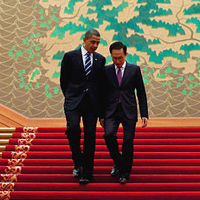South Korean President Lee Myung-bak arrived for a state visit to Washington in October in time to celebrate the passage by the U.S. Congress of the U.S.-South Korea Free Trade Agreement with U.S. President Barack Obama. But back home in South Korea, the bill continues to face spirited opposition, with the current debate revealing potential cracks lurking beneath apparently healthy U.S.-South Korea relations. In fact, due to political changes in South Korea, the friction over the FTA could be just the first sign of deteriorating relations between the two countries.
South Korean opposition parties have come together to vigorously oppose the FTA, while the ruling Grand National Party (GNP) is pushing for its quick ratification. Amid rumors of physical obstruction of the bill by opposition parties and a likely scuffle in the National Assembly, a legislative session on Nov. 3 was canceled 10 minutes before its scheduled start time. The standoff is expected to continue, as the next plenary session has not yet been scheduled.
The sticking point holding up passage of the bill is the investor-state dispute (ISD) settlement clause, which would allow American companies that feel they have lost money in a South Korean legal proceeding to sue the Korean government through an international body. The opposition DP is arguing that this would give large American firms undue room to bully small and medium-sized South Korean enterprises, and along with other opposition groups wants the clause removed. The GNP is insisting on its inclusion.

